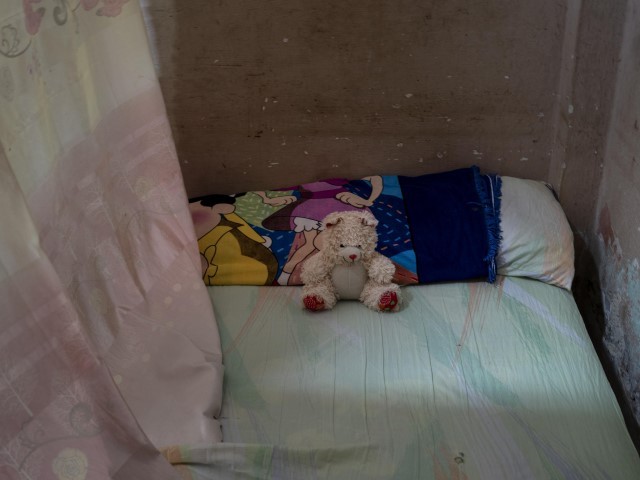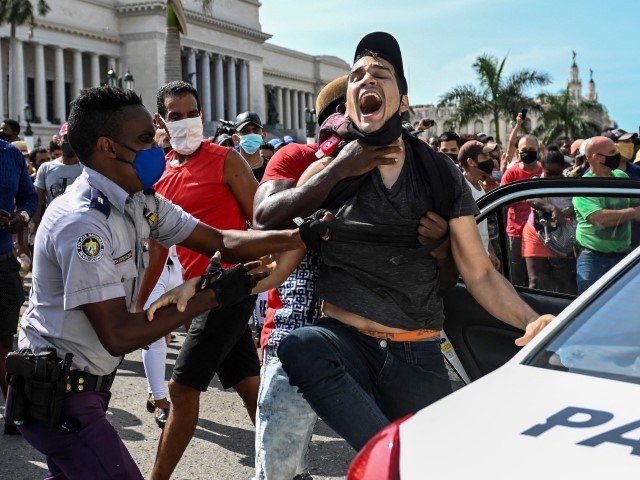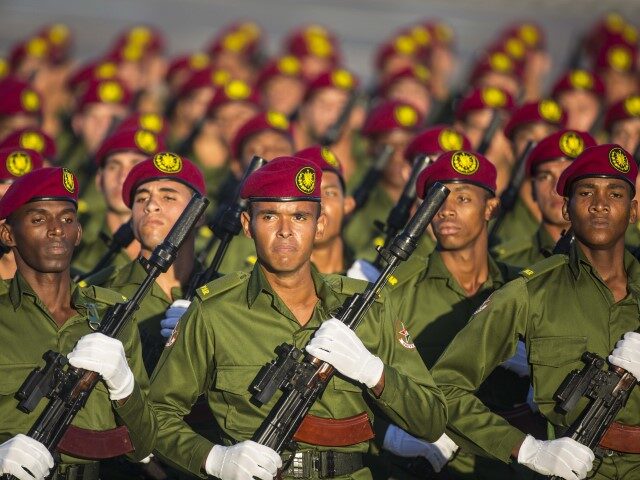A group of former Cuban military officials who defected from the communist regime called on active servicemen and other agents of the state to refuse to follow orders to repress their countrymen, the Cuban independent outlet 14 y Medio reported on Monday following violent attacks on unarmed civilians this weekend in Camagüey.
Camagüey, a central-eastern province whose capital lies about 340 miles from Havana, experienced days of protests that began on Thursday night after months of unpredictable and increasingly long electrical blackouts. The population of Nuevitas, Camagüey, took to the streets banging pots and pans demanding power, food, and other basics the Communist Party has failed to provide for its population for decades, prompting police to physically assault the protesters and disappear some of the most vocal participants.
In one particularly harrowing exchange caught on grainy mobile phone video, Cuban police officers appear to beat three girls in an attempt to arrest the father of one of them. The girls, about 11 or 12 years old, said in an interview published following the incident that police delivered blows to their ribs and legs; one girl showed her bloody toenails, not specifying how she received the injury.
Cuba has been under communist totalitarian rule since 1959, when leftist mass murderer Fidel Castro ousted the government of then-dictator Fulgencio Batista. Castro and his cronies used prison torture, forced disappearances, labor camps, “psychiatric” torture, and forced exile to subdue the population, which widely rejected Castro and communism; Castro did not win a single election in his lifetime. Currently, under the rule of puppet “president” Miguel Díaz-Canel, a new generation of Cubans has reinvigorated national acts of protests, most prominently executing a national day of anti-communist manifestation on July 11, 2021. Protests have continued nearly incessantly since that day, prompting the Castro regime to “disappear” and imprison hundreds of people, prominently sentencing children to decades in prison for calling for an end to the regime.

A teddy bear rests on the bed of Mackyanis Yosney Romam Rodriguez who is in prison along with her two brothers, accused of participating in the recent protests against the government, at their home in La Guinera neighborhood of Havana, Cuba, Wednesday, Jan. 19, 2022. (Ramon Espinosa/AP)
The former Cuban officials, under the organization name “Military Objectors of Conscience,” published a statement referring to the Camagüey protests through the non-profit Cuban Conflict Observatory asking the nation’s soldiers and law enforcement officers to take “the people’s side” and help “end this corrupt mafia dictatorship,” referring to the Castro regime.
“Our comrades in arms cannot and should not fulfill the orders emanating from a dictatorship that has disassociated with the wellbeing of the people and today pushes Cubans towards ever greater misery,” the statement read in part.
The regime, it continued, “should be rejected definitively by the entire country, but especially the Revolutionary Armed Forces.”
The defectors named the head of the military’s Eastern Army, Rigel Tejeda, as having especial responsibility in rejecting the regime given that he presides over military operations in Camagüey. The military, the letter read, “should not act as a private military at the service of those who show off their yachts while millions of Cubans go to bed without eating, without electricity, without medicine, and without a roof over their heads.”
The group warned that the the crackdown on the Camagüey protests appeared to be “a rehearsal for a new wave of national repression.”
The independent outlet Cubanet appeared to corroborate those fears in a report Saturday from Granma province, southeastern Cuba, in which the Castro regime appeared to be arming sympathizers in anticipation of further protests outside of Camagüey. In Yara, Granma, the Communist Party’s local “Public Health” Municipal Office handed out rods to what it called a “rapid response brigade” to be used to batter anti-communist protesters. The Castro regime regularly organizes communist civilians for violent attacks intended to humiliate dissidents known as actos de repudio (“acts of repudiation”), meant to have a chilling effect on dissent and punish dissenters. Following the July 11, 2021, protests, Díaz-Canel issued an “order of combat” on national television allowing any Cuban citizen to violently assault someone suspected of opposing the regime, with impunity.

A man is arrested during a demonstration against the government of Cuban President Miguel Diaz-Canel in Havana, on July 11, 2021. (YAMIL LAGE/AFP via Getty Images)
The protests that prompted the call to organize “rapid response brigades” began in Nuevitas on Thursday evening with Cubans banging pots and pans in the street – a common way to express opposition to the government in Latin America – and singing the national anthem. Cubanet, which published video of the initial protests, noted that Nuevitas had endured three months of rolling electrical blackouts prior to the protests.
The protests continued throughout the weekend, prompting escalating government violence. On Friday, according to a video published on Saturday by the online outlet Cubanos por el Mundo, police violently assaulted three girls aged about 11-12 years old who attempted to protect the father of one of them as police tried to arrest him. The father and the girls were among a large contingent that had taken to the streets on Friday to peacefully march against the regime.
A woman named Lucía Rodríguez identified the father in a Facebook post published on Saturday as her brother, José Armando Torrente, and his daughter as 11-year-old Gerlin Torrente Echevarría. Rodríguez said that her brother was missing at the time of her writing and was beaten “unconscious” at the protest, presumably in front of his child. Breitbart News could not independently confirm the identities of those involved at press time.
“We were walking and the police got down with a bunch of people there. … I was grabbing my father and she was holding on to him, and then, to arrest my father they had to beat us,” one of the girls says in the interview.
“I also hit them back because they hit me,” another of the girls says.
Warning – Graphic Images:
In a separate incident in the city that appeared to occur on Saturday, Cuban civilians held back a contingent of “black berets,” the reportedly Chinese-trained domestic repressive forces, by hurling rocks at them, forcing them to retreat.
As of Sunday, Nuevitas had some limited access to electricity.

COMMENTS
Please let us know if you're having issues with commenting.